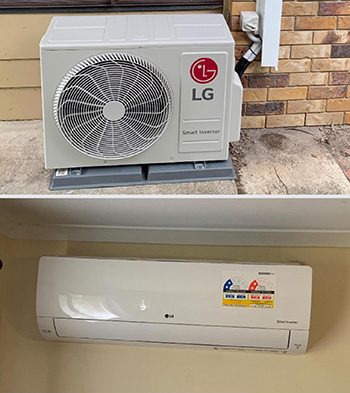 Winter on the Sunshine Coast may not be as severe as in other parts of Australia, but it still brings a chill that makes heating essential for comfort. At DNA Queensland Electrical, we often get asked about the most economical options for winter heating. This blog post will explore the pros and cons of two popular heating methods: gas heaters and split air conditioning systems. We'll delve into the running costs, efficiency, and suitability for Queensland's coldest winter months to help you make an informed decision.
Winter on the Sunshine Coast may not be as severe as in other parts of Australia, but it still brings a chill that makes heating essential for comfort. At DNA Queensland Electrical, we often get asked about the most economical options for winter heating. This blog post will explore the pros and cons of two popular heating methods: gas heaters and split air conditioning systems. We'll delve into the running costs, efficiency, and suitability for Queensland's coldest winter months to help you make an informed decision.
Understanding Heating Options
Before diving into the specifics, let's briefly define the two heating options:
- Gas Heaters: These use natural gas or LPG to generate heat. They come in various forms, including flued heaters (which expel gases outside) and unflued heaters (which expel gases into the room).
- Split Air Conditioning Systems: These are electric systems that can both cool and heat a space. They consist of an indoor unit and an outdoor unit, connected by refrigerant piping.
Pros and Cons of Gas Heaters
 Pros:
Pros:
- High Heat Output: Gas heaters provide intense and immediate warmth, making them effective for heating large spaces quickly.
- Cost-Effective Fuel: Natural gas is often cheaper than electricity, which can make running costs lower in some regions.
- Independence from Electricity: In case of power outages, gas heaters (especially portable ones) can still operate, ensuring you stay warm.
Cons:
- Installation and Maintenance: Flued gas heaters require professional installation, and regular maintenance is crucial to ensure safety and efficiency.
- Safety Concerns: Unflued gas heaters can release harmful gases like carbon monoxide into the home, requiring good ventilation.
- Limited Availability: Natural gas may not be available in all areas, particularly in more rural parts of Queensland.
Pros and Cons of Split Air Conditioning Systems
 Pros:
Pros:
- Versatility: These systems provide both heating and cooling, making them a year-round investment.
- Energy Efficiency: Modern split systems are highly efficient, with many units featuring inverter technology that adjusts output to maintain a consistent temperature.
- Safety: Split systems are generally safe, with no open flames or gas emissions.
Cons:
- Higher Initial Cost: The purchase and installation of a split system can be more expensive compared to portable gas heaters.
- Electricity Dependency: They rely entirely on electricity, so a power outage means no heating.
- Running Costs: Depending on electricity prices, running costs can be higher, especially if the system is not energy-efficient or if insulation in the home is poor.
Running Costs Comparison
When it comes to running costs, several factors need to be considered, including the efficiency of the heating system, the size of the space being heated, and local energy prices.
Gas Heaters:
- The cost of running a gas heater largely depends on the price of natural gas or LPG. On average, a typical gas heater might cost around $0.05 to $0.10 per MJ (megajoule) of heat produced.
- For a medium-sized room, a gas heater might consume 15 to 25 MJ per hour, leading to an approximate running cost of $0.75 to $2.50 per hour.
Split Air Conditioning Systems:
- The efficiency of split systems is measured in terms of their COP (Coefficient of Performance), which is the ratio of heating output to electrical input. Modern systems can have a COP of 4 or higher, meaning they produce 4 units of heat for every unit of electricity consumed.
- On average, the running cost for a split system might be around $0.20 to $0.40 per hour, depending on the unit's efficiency and electricity rates.
Environmental Impact
 Environmental considerations are increasingly important for many homeowners:
Environmental considerations are increasingly important for many homeowners:
- Gas Heaters: Burning natural gas produces carbon dioxide, a greenhouse gas. Although it is cleaner than coal, it still contributes to greenhouse gas emissions.
- Split Air Conditioning Systems: These rely on electricity, which in Queensland is predominantly generated from coal. However, they can be more environmentally friendly if powered by renewable energy sources such as solar panels.
Suitability for Queensland Winters
Queensland winters, particularly on the Sunshine Coast, are relatively mild compared to southern states. This means that the intense heat output of gas heaters might be overkill for many homes. Split air conditioning systems, with their ability to provide gentle, consistent heating, are often more suitable for maintaining a comfortable indoor temperature without the risk of overheating.
Making the Right Choice
 Both gas heaters and split air conditioning systems have their merits and can be economical choices depending on your specific needs and circumstances. Here are some key takeaways to help you decide:
Both gas heaters and split air conditioning systems have their merits and can be economical choices depending on your specific needs and circumstances. Here are some key takeaways to help you decide:
- Gas Heaters are ideal for those who need quick, intense heat and have access to natural gas or LPG. They are also useful during power outages.
- Split Air Conditioning Systems offer versatility and efficiency, making them a good long-term investment for year-round comfort. They are safer and can be more environmentally friendly, especially when used with renewable energy.
At DNA Queensland Electrical, we understand that choosing the right heating solution for your home can be challenging. Our experienced team is here to provide expert advice and installation services to ensure you stay warm and cosy during Queensland's coldest winters. Contact us today to discuss your heating needs and discover the most economical and efficient options for your home.




















































